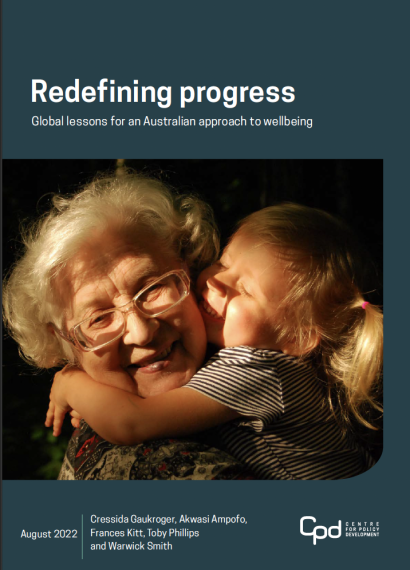Redefining Progress: Global lessons for an Australian approach to wellbeing
Redefining Progress is a report from the Centre For Policy Development’s Wellbeing Initiative. Looking at 21 global approaches to wellbeing over the past 50 years it identifies four key characteristics of advanced wellbeing approaches to guide an Australia’s wellbeing journey.
- Measure what matters It is only with the right kinds of measurements that we can assess the outcomes of budget allocations and policy selection. Measurement must be a means rather than an end. It must be timely, able to be disaggregated, have a measure of consistency while being responsive to change in accordance with best practice, and tolerate both ambiguity and gaps in data availability.
- Guide decisions with data The purpose of wellbeing frameworks is to optimise wellbeing, not the practice of measuring wellbeing. It is on this point – the translation of measurement and principles to policy – that we see wellbeing approaches stumble. Practical decision-making guidance takes wellbeing beyond abstract rhetorical statements into day-to-day policy design, decision-making and implementation.
- Embed wellbeing across institutions Governments are changing how they do business to achieve their wellbeing goals. Governments have many tools at their disposal here: from creating central coordinating teams to working with citizens and communities to set priorities.
- Build accountability for progress Transparent assessment and reporting guards against corner-cutting and lip-service, and can be implemented with appropriate measures to enable frank advice from public servants and robust debate among elected officials. The strongest measures combine reporting with additional mechanisms such as independent oversight and structural changes in the way departments work together.
Endorsements for Redefining Progress

Future generations can thrive if we chart a course to wellbeing in Australia. Embedding a sophisticated approach to wellbeing in the design, delivery and evaluation of services for children and young people at all levels of government is the right thing for Australia to do. The Nest – Australia’s wellbeing framework for children and young people provides a way of thinking about the whole child in the context of their lives. The consideration of wellbeing is not new, and we all benefit from the developing understandings of what contributes to a ‘good life’. Penny Dakin – CEO, ARACY

Australians want to see progress towards wellbeing. They judge government on how well it advances the things that matter most to them and their communities. Upgrading our government to pursue wellbeing will strengthen communities, boost faith in institutions and bring us closer to the society we want to become.

It’s time to put wellbeing at the heart of government, and this is critically important to reduce poverty and inequality in Australia. People whose needs are not met by legacy approaches to government will be the greatest beneficiaries of wellbeing government, and with more than half the OECD and several states and territories already making this journey, Australia should join them. Edwina MacDonald – Acting CEO, ACOSS




